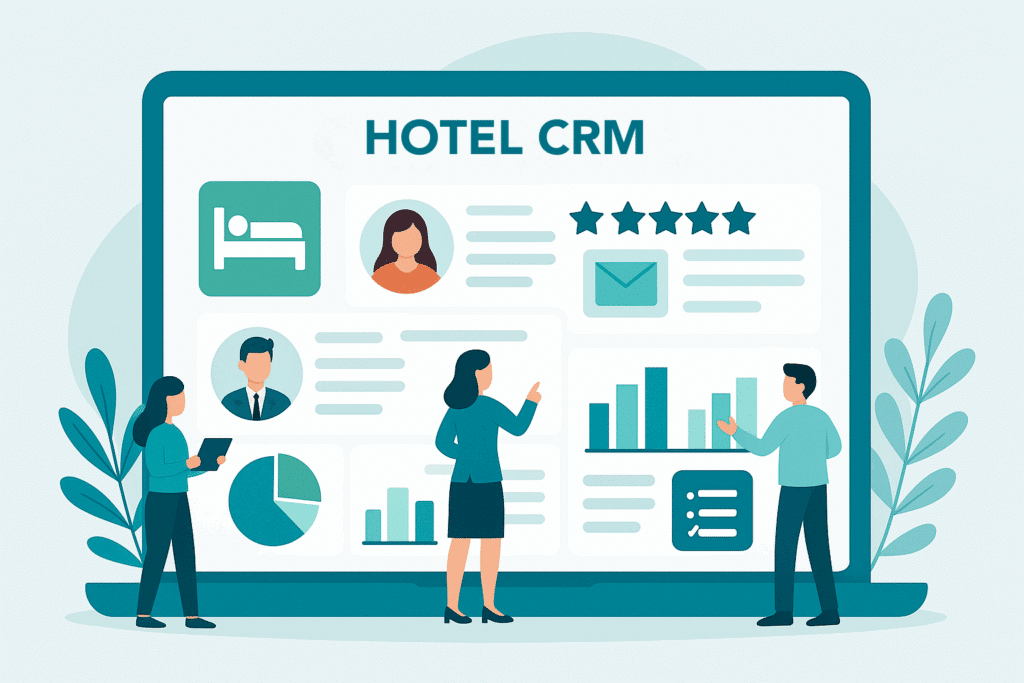
In a hotel, each reservation is much more than just a room occupied. It is the starting point of a customer journey which, if well orchestrated, can turn a one-time interaction into a lasting relationship, and a stay into a lever for economic performance.
That’s where the hotel CRM comes in.
Designed not just as an isolated tool, but as the conductor of customer relations, a CRM enables the structuring, automating, personalising, and optimising of every moment of the journey. From “raw” data to loyalty, from pre-stay communication to strategic analysis, it supports hotel teams at every stage.
Here’s how.
It all starts with data
Connection to PMS and centralisation
A hotel CRM like Experience connects to the hotel’s PMS to retrieve history and future bookings. This synchronisation allows building a reliable, enriched, and actionable customer database from the moment of implementation. Each new reservation then becomes a customer relationship opportunity: the CRM will identify the profile, list stays, suggest additional services, and access preferences… all fed into a guest file.
Engaging the customer at every stage of the journey
Before, during, after: continuous communication
On the other hand, as soon as a new reservation is detected, the CRM enables triggering a relationship scenario:
- Pre-stay: sending a pre-stay form, personalised upsell proposals (upgrades, additional services…), pre-checkin
- During stay: welcome message, quality control, useful information via the room directory or a digital concierge service
- Post-stay: satisfaction surveys, thank you emails
The benefit of a CRM for customer relations is to automate sending, contextualise, and personalise them without time loss. It’s not about “communicating more,” but “communicating better.”
Customer segmentation: the foundation of personalisation
From “raw” data to targeted action
In its first state, your customer data is like uncut diamonds. Once structured and analysed through a CRM, they reveal their full value: fine segmentation, deep customer knowledge, and better-targeted actions.
Indeed, once the data is consolidated, the CRM plays an essential role in segmentation. Using behavioral (frequency, average spend, type of stay…), transactional (type of room, additional services…), or relational (satisfaction, responsiveness to emails…) criteria, each customer can be classified into actionable segments.
This allows you to:
- Adapt hotel email campaigns to the right profiles
- Automatically trigger offers with a high probability of conversion
- Prioritise communications according to each customer’s potential
Communicate effectively: newsletters, marketing campaigns
The right message, to the right person, at the right time
With the data obtained and its integrated email marketing module, Experience CRM allows for lasting action with:
- Automation: these mailings are conditioned on specific triggers (e.g., 3 days before the stay, no visit for 6 months, high average spend, customer’s birthday…)
- Occasional mailings: newsletters, flash offers, event announcements
The mail builder simplifies visual creation, using templates. Pre-segmented mailing lists are also easily exploitable for individual hotels or hotel groups.
The result: communication that does not overwhelm the customer but truly speaks to them.
Foster customer loyalty and maximize their value
Reward, recognise, retain
A CRM is not limited to maintaining the link; it is also a vector of loyalty. An all-in-one CRM allows identifying recurring or high-potential customers and building tailor-made reward logics:
- Number of nights
- Total amount spent
- Frequency of stays…
Specific campaigns can then be triggered: thank yous, VIP offers, upgrades… With a CRM, loyalty is no longer a sporadic initiative but a well-thought-out and permanent relational mechanic.
Reputation and quality: customer feedback in the service of performance
Satisfaction surveys, review management, and AI support
Other modules of the CRM also allow automatically soliciting the customer via a satisfaction survey and a request to leave an online review (Tripadvisor, Google, etc.) after their departure.
Complete hotel CRMs like Experience CRM also include an e-reputation module, capable of:
- Centralising reviews received on more than 40 platforms
- Generating personalised answer, assisted by AI
- Producing quality reports according to customised elements
This allows hotels to act quickly in the event of dissatisfaction… and to capitalise on positive feedback to improve their visibility on the numerous review platforms available.
Business intelligence: transforming usage into strategy
Guide, compare, anticipate
In the CRM, each customer action, each conversion, each review enriches a real-time accessible analysis database. Thus, the Business Intelligence section of Experience CRM provides access to instant reports:
- Email capture, customer satisfaction rate, satisfaction about the staff, customer relations effectiveness
- Database with detailed profiles, OTA profiles, buyer personas, KPIs for stays
- Marketing with revenue figures, bookings, mailing efficiencies
It’s also a major asset for hotel groups, who can compare performances between hotels, share segments, and coordinate large-scale actions.
A tool that evolves with its hoteliers
Like your hotel, the CRM is continually evolving
As guest expectations change, technology evolves, and practices vary from one hotel to another, a hotel CRM needs to adapt continuously.
At Experience CRM, the tool evolves continuously:
- Integration of new features taking into account new trends (AI, WhatsApp…)
- Connections to other partner hotel services
- Optimisations based on user feedback
This ability to continuously adapt makes the CRM a true partner in hotel performance.
Conclusion: more than a tool, a relationship engine
A hotel CRM is not just an interface. It’s the heart of a smooth, structured, and performance-oriented relational ecosystem. From first data to strategic reports, it also supports hotels in each interaction.
With Experience CRM, this orchestration is performed automatically, intelligently, and without complexity. It generates additional revenue, strengthens loyalty, saves operational time, and allows managing activity with more insight. And importantly, it puts customer relations back at the center of the hotel industry, where it has always belonged.

